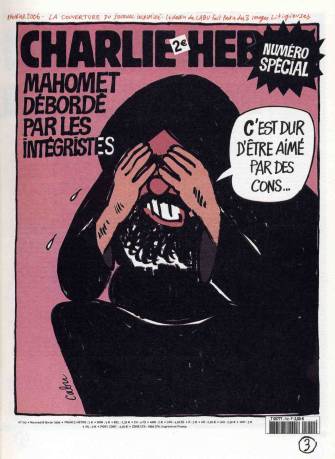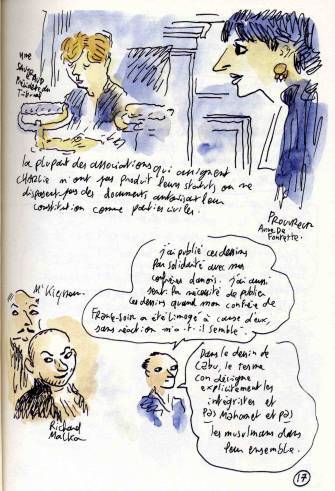 Home > Bart Beaty's Conversational Euro-Comics
Home > Bart Beaty's Conversational Euro-Comics Greffier
posted November 3, 2007
Greffier
posted November 3, 2007

 By Bart Beaty
By Bart Beaty
I'm not sure that I can really "review"
Greffier, the new
Joann Sfar book from Delcourt's
Shampooing line. The book doesn't really lend itself to a discussion of its strengths and weaknesses in the traditional sense since it such a non-traditional comic. Sfar's book is really a series of notes about a trial, and this may be nothing more than notes about notes about a trial.
A
greffier is a law clerk or legal secretary, and that is the role into which Sfar cast himself for two days in February of this year. Sfar positioned himself as a witness to
the trial of French newsweekly Charlie Hebdo, who had charges brought against it after they published the infamous Danish Cartoons, along with a cover illustration, by Cabu, portraying Mohammed overwhelmed by fundamentalists.

There is never any doubt as to whose side Sfar is on during this process. The book is introduced by
Richard Malka, Charlie's lawyer. Sfar himself had previously published in
Charlie Hebdo (about 80 pages of this material is included as a sort of appendix to the book), and the defendants are his friends. Since the book is never presented as unbiased this is not a particular problem, but it does pose some limitations. Sfar can be easily accused of preaching to the choir in a book like this one, and, as with any such work, it is not always wholly resonant for readers with any sort of reservations.
I taught a graduate class at the
University of Calgary last year on the topic of the
Danish Cartoons. In that class we examined the issue from a variety of theoretical and methodological lenses, beginning, in the first week, with the lens of free speech and the traditions of liberalism. My students, who came from no fewer than five countries with very different traditions of free speech legislation, ultimately agreed that the free speech aspects of the case were probably the least interesting, though the most remarked upon. They identified the Danish Cartoons as symptomatic of much larger -- and more urgent -- issues surrounding the movement of people in a globalized world, and their papers largely pressed these issues. For my own part, and speaking of someone who is anything but a free speech absolutist, I also found the free speech arguments tiresome and often unproductive, so I was eager to get Sfar's take on this subject. I was curious as to whether this artist, who I so greatly admire, could win me over to his point of view.
In the two days of the trial, Sfar drew -- and painted -- 121 pages of comics, which is a staggering accomplishment any way that you think about. With hands presumably flying as quickly as the stenographer's, he took copious note of the advocates and the lawyers, providing a strong sense of the overall process. The trial, which included testimony or submissions from two candidates for the Presidency (
Nicolas Sarkozy and
Francois Bayrou), as well as the partner of a third (
Francois Hollande). Indeed, the trial presented a veritable who's who of the French political and cultural elite, all arriving to defend the secularization of France and the absolute separation of church and state. Sfar captures all of this very well, despite, by his own admission, his difficulty in capturing the likenesses of the likes of Hollande and Bayrou.

For the most part, Sfar allows the various participants to speak their own mind, with occasional commentary of his own. When the anti-
Charlie forces take the stage, however, he is unable to curb his sarcastic barbs. It is clear that he feels strongly about this issue, but he never really made me feel that I should share that passion. Reading the documents included in the book, particularly the sidebar column that accompanied the original publication of the cartoons, I felt strangely
less sympathy for
Charlie Hebdo than I had previously. It seemed clear to me that the trial included a number of eloquent people addressing a principle which they held dear, but I never had a sense that this principle was ever truly in danger in France in this instance. And, further, I felt that the narrow focus of the book on the trial itself served to deflect attention away from uneven social relations in France that are, to my mind, far more pressing issues. In the end I didn't get the sense that this was a great judicial triumph so much as a distraction from more important things. So even when I was nodding in agreement with the testimony Sfar records, a voice in the back of my head couldn't help but wonder about all of the issues that don't get raised in a trial -- or a book -- like this one.
In the end,
Greffier isn't so much an argument as it is a witnessing of events. It is interesting for what it is, although it is not likely to be a work that is widely read in the future as interest in the trial subsides. In the end, it didn't convince me, but that might be more a function of the limitations of the process than of the book itself. By narrowly casting its argument about the Danish Cartoons, the trial had fairly limited pedagogic value. I would certainly be interested in seeing an artist of Sfar's calibre take on a wider ranging consideration of many of the issues that are raised by
Greffier.
*****
Greffier, Joann Sfar, Delcourt: Shampooing, 229 Pages, 978-2756010649, March 2007
*****
To learn more about Dr. Beaty, or to contact him,
try here.
Those interested in buying comics talked about in Bart Beaty's articles might try
here or
here.


